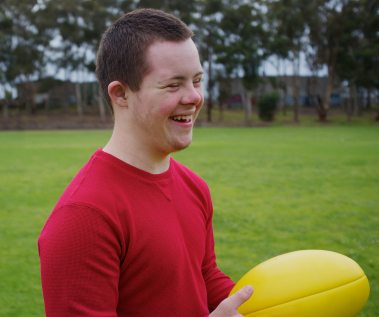Accommodations for students with cognitive impairments can include the use of visual cues, mixed media, and the repetition of major points. Experiential exercises are often effective for a young person with intellectual or cognitive disabilities. Role-playing works well for a person with developmental disabilities – the process of playing a role themselves helps them to internalize it.
The use of verbal and nonverbal cues will help increase participation and learning for students with cognitive disabilities and make the groups run more smoothly for all. People with cognitive impairments are often impulsive because they lack normal feedback mechanisms. They do not wish to be impulsive, but lack the ability to regulate these behaviors for themselves. Therefore, youth workers, and peer students should try to provide external cues until the student can internalize it. The youth worker and the youth with a disability can design the cues but should keep them simple, such as touching the person’s arm and saying a trigger word (e.g. “interrupting”). If cues are used in a setting where other people will observe them, alert the group to the cue in a matter of fact way as you would alert them to a use of a dog or the space needed for a wheelchair. Cueing can be useful for people with other types of disabilities and for other purposes as well.
For students with ADHD, it is helpful to establish a maximum length of time, for example, 10 minutes, for presentations. Another modification to the group setting, which is beneficial for those with developmental disabilities or brain injury (as well as for other students), is to set aside 10 minutes at the end of the meeting to reinforce what was taught during the group. Such discussion ensures that content is retained and promotes active rather than passive learning. Some students with cognitive disabilities may have problems with time management and will need to be reminded of group meeting times with an email, call, or text.
It may be necessary to make changes to group learning activities in order to accommodate students with cognitive disabilities. The use of alternative media to replace traditional learning tools, such as writing and reading, can be very useful. An individual who has an expressive language disorder may be unfairly judged as uncooperative in participating in group discussions. However, given the opportunity to express himself or herself through artwork, they may be able to communicate quite a bit.
Mixed media can be incorporated in other ways as well. As a group learning exercise, students could work together to “draw the narrow way” depicting all the potential stumbling blocks they might expect to encounter as they go back to school. Students can create memory books or journals (to capture the content of each bible study), or flash cards (or words or pictures) to jog memory of previously taught stories or lessons.
Youth workers should not assume, however, that one student’s experience will be understood by another, particularly in the case of a student with a cognitive disability. There may be a great deal of shared experience, but the student with a disability may not understand it unless it is made specific and pertinent to their own life.

